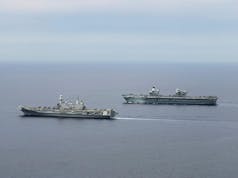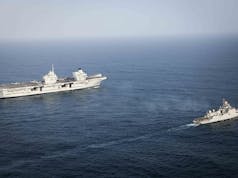British services firm Serco has announced it is to acquire the US Naval Systems Business Unit for $225m.
NSBU is a leading provider of naval design, systems engineering, as well as production and lifecycle support services to the US Navy, US Army and Royal Canadian Navy.
In the 12 months to September 2018 NSBU had revenues of $336m, which compares with Serco’s North American Defence revenues in 2018 of $453m; NSBU has an order book of around $600m and a new business pipeline of over $2bn.
Commenting on the Acquisition, Rupert Soames, Serco Group Chief Executive, said:
“This is an important step for Serco which materially adds to the scale and capability of our US defence business, and in particular to the maritime support segment. Serco employs some 6,000 people in North America, of whom 2,300 work in defence, and has been providing services to the US Navy for nearly 30 years, so we know this market well. NSBU, which employs around 1,000 people, brings world-class ship and submarine design, systems, and engineering services, production support and in-service sustainment capabilities, which are highly complementary to Serco’s existing skills in ship modernisation, hardware integration and naval logistics.
The combined business will be a top tier supplier of services to the US Navy, which has recently announced plans to increase the fleet from 280 to 355 ships by 2034, and we see a long-term and growing demand for the capabilities that the combination of Serco and NSBU will be able to provide. We are financing the Acquisition through a mix of debt and equity which will allow us to maintain leverage well within our target range of 1-2x EBITDA, and we expect the Acquisition to be materially accretive to earnings in the first full year of ownership.
We greatly look forward to welcoming our new colleagues to Serco. The current management team of NSBU will continue to run the business and lead the integration into Serco, and we know they are as excited as we are by the opportunity to create a major new supplier of maritime engineering services, combining our joint capabilities in ship and systems design, modification and sustainment.”
Serco Group plc is a British provider of public services with headquarters based in Hook, Hampshire. Serco operates in six sectors of public service provision: Health, Transport, Justice, Immigration, Defence, and Citizens Services.














Watch them go bust in the next 12 months….
I hope not serco does lots for our navy in the UK and around the globe. Serco does lots of very important things like fleet suport to all our navy bases, immigration, tag system for prisoners, looks after Australian garrisons, Ascension Island, Brize Norton, balistic missile defence upgrade work, getting our nuclear submarines and carriers in base safely with tugs and lots more. Thy simply can’t go bust.
They also pretty much run the Sultan of Oman’s airforce. Serco have also got the contract to develop and build the UK’s first satellite launching facility in the North of Scotland.
Serco Denholm run what was once the Royal Maritime Auxiliary Service, with their distinctive colour schemed Tugs and other vessels.
Seems they must do something right then despite their appalling reputation.
what was serco called before?
Just had a quick look,it was called RCA Services Limited.I hope they do indeed prove successful but as an ex employee I still have a sour taste in my mouth.
Dare I ask, as an interested observer, what happened?
Basically their Business model involves winning tenders for contracts that they cant earn any money from,look at the ratio between turnover and profit.In our case they hadn’t done their homework properly,completely underestimated the service levels and were not too keen on recruitment to help fill the gaps.
Oh dear that sounds remarkedly like a certain other highly Governmrnt dependent construction, support and services business that grew to simply absorb the turnover to survive that was too big to fail… but when you read its history inevitably did a few years back.